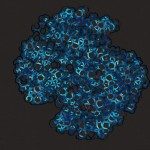Link to Pubmed [PMID] – 24810289
PLoS ONE 2014;9(5):e96918
The RpoS/σS sigma subunit of RNA polymerase (RNAP) controls a global adaptive response that allows many Gram-negative bacteria to survive starvation and various stresses. σS also contributes to biofilm formation and virulence of the food-borne pathogen Salmonella enterica serovar Typhimurium (S. Typhimurium). In this study, we used directional RNA-sequencing and complementary assays to explore the σS-dependent transcriptome of S. Typhimurium during late stationary phase in rich medium. This study confirms the large regulatory scope of σS and provides insights into the physiological functions of σS in Salmonella. Extensive regulation by σS of genes involved in metabolism and membrane composition, and down-regulation of the respiratory chain functions, were important features of the σS effects on gene transcription that might confer fitness advantages to bacterial cells and/or populations under starving conditions. As an example, we show that arginine catabolism confers a competitive fitness advantage in stationary phase. This study also provides a firm basis for future studies to address molecular mechanisms of indirect regulation of gene expression by σS. Importantly, the σS-controlled downstream network includes small RNAs that might endow σS with post-transcriptional regulatory functions. Of these, four (RyhB-1/RyhB-2, SdsR, SraL) were known to be controlled by σS and deletion of the sdsR locus had a competitive fitness cost in stationary phase. The σS-dependent control of seven additional sRNAs was confirmed in Northern experiments. These findings will inspire future studies to investigate molecular mechanisms and the physiological impact of post-transcriptional regulation by σS.











